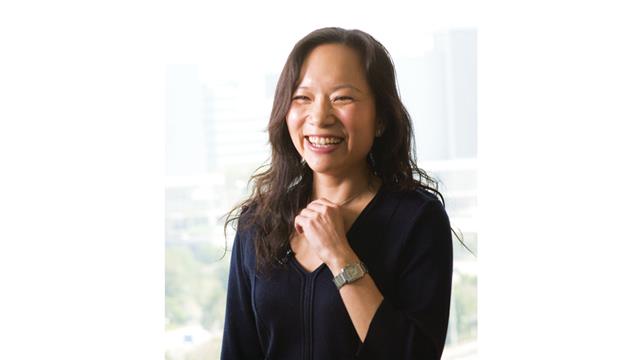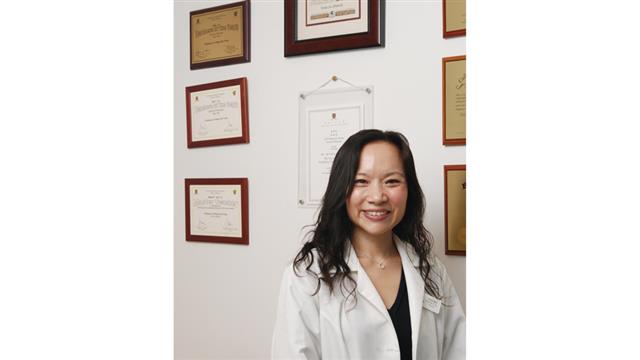You are one of the two recipients of the 2014 University Education Award, one of the highest accolades for teaching excellence at CUHK. What does the award mean to you?
The award is a wonderful recognition of my teaching and a great source of encouragement. I'm very happy and honoured to receive it. I love my job as a teacher and would have done it regardless. Since I joined CUHK in 2000, I learn about teaching every day from my students, not only in the classroom but also in the community.
What would you cite as your most remarkable achievement in your teaching career so far?
One challenge for teachers is how not to focus on research at the expense of other important duties. I use a model which I call RCT—research, clinical service, and teaching, to ensure the three components reinforce, infuse and support each other, so that research will strengthen learning and enable application in a public setting; while community experience will inform research and teaching. This model has been very useful for me in the last 14 years. In the past two years, I also introduced inter-professional teaching or learning. In the Faculty of Medicine, we treasure multidisciplinary teamwork and share the common goal of improving public health and enhancing drug safety. Through various teaching platforms, I have been striving to make inter-professional learning more effective at the medical faculty.
You have a whole collection of awards in your bag—the Vice-Chancellor's Exemplary Award, the Master Teacher Award, and several Teacher of the Year Awards. What do you think makes you such an outstanding teacher?
I'm passionate about my work and I hope my students will be well-trained pharmacists and professional goalkeepers for drug safety. That said, I couldn't have done what I did without the academic freedom of the school and of CUHK, the supporting facilities, and the high quality of the students and the inspiration they give me.
Does personality have anything to do with effectiveness in teaching? What do you like most about teaching?
Openness and a positive attitude may have something to do with my teaching style. To me, nothing is impossible, if you try hard enough. I have been an optimist since a child and also internalized my parents' values—be humble, be generous and be a serving citizen. My outreach experience was entirely voluntary with the goal to address and solve drug-related problems in the community. I would never imagine to gain so much for my research and teaching with impact not only on patients but also on my students.
You started the first clinical pharmacy clerkship programme in the School of Pharmacy, as well as overseas student exchange in clinical pharmacy with USC. Could you talk a little about that?
When I joined the school, one of my main duties was to develop clinical pharmacy, an area that is still in its infancy in Hong Kong. That said, we do have a group of dedicated pharmacists in Hong Kong who are the gatekeepers for medication safety. Hong Kong is a few paces behind countries with developed clinical pharmacy research and teaching. Spending time in USC (University of Southern California) would expand my students' perspective and enhance their professionalism, and that, I hope, will eventually benefit Hong Kong.
Were there teachers who impressed you as a student, who made you go 'Now that's a cool teacher. I want to be like him/her some day.'?
I went to university and graduate school in the US. I was very lucky to have excellent teachers. Two in particular, both from USC, made an impression: Dr. Gladys Mitani and Dr. Mary Gutierrez. Both of them were extremely passionate and seemed to have infinite energy despite having been teaching for many years. I wondered if I would have their drive when I was their age. They also demonstrated that their professionalism could really bring improvement to the patients' health.
You worked as a clinical pharmacist at an acute-care hospital in California. Did that experience in LA in general contribute to your view of the ideal classroom setting?
The way hospitals operate in the US is very different from the way they do in Hong Kong. In the acute care hospital in the US, ward rounds were part of the job for pharmacists, and when there were emergency cases, say, if a patient was suffering from cardiac arrest, we had to carry the crash cart and follow the specialist to the bedside to render support to cardiopulmonary resuscitation. Pharmacists in Hong Kong don't need to do that. My experience in the US showed me the frontline roles a pharmacist can play. Therefore, it is my job to prepare my students to be proactive team members in patient care and be ready for new challenges in the future. I hope there will be more clinical roles for pharmacists here in the future.



